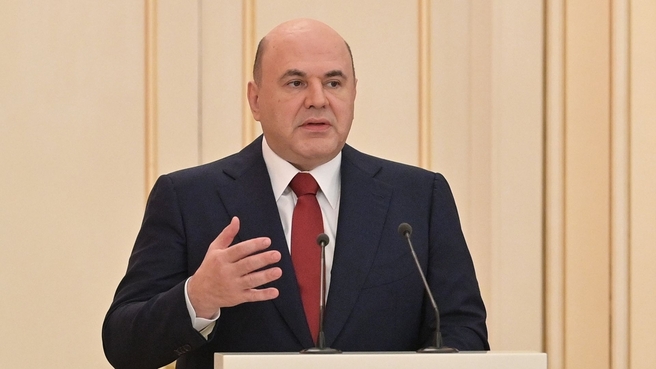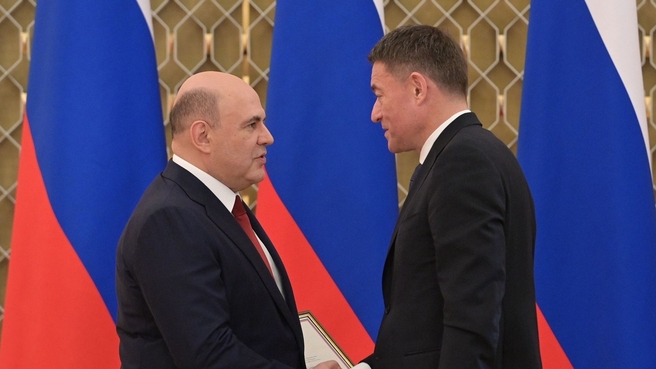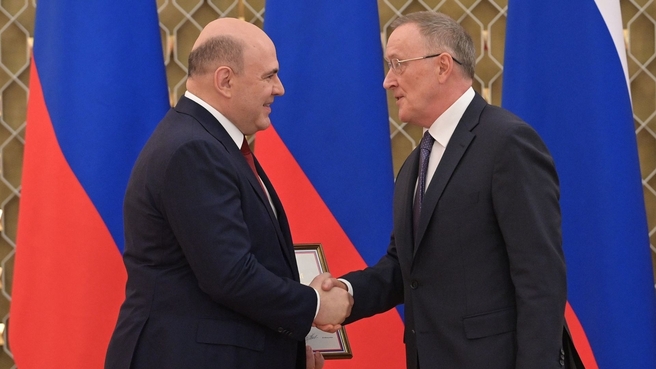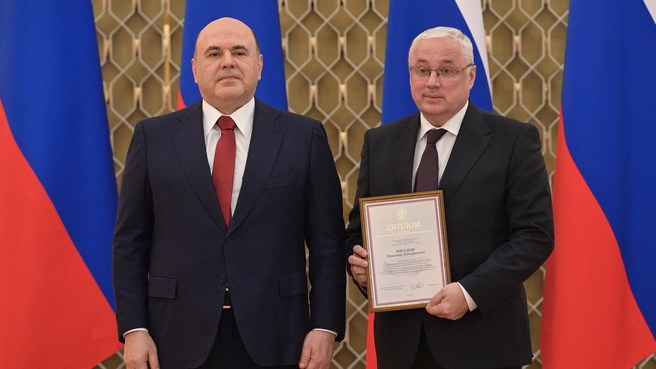
Mikhail Mishustin presents Government science and technology awards. With Rector of the MPEI National Research University Nikolai Rogalev
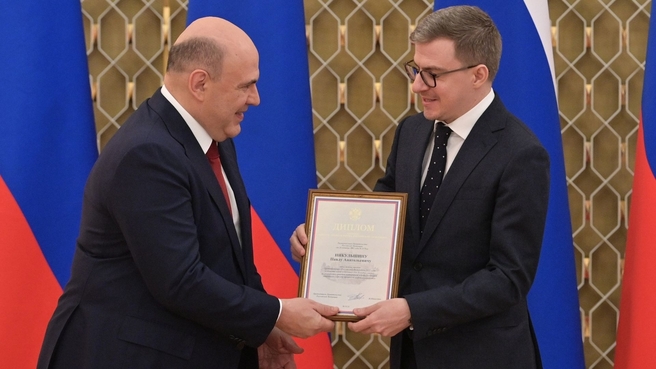
Mikhail Mishustin presents Government science and technology awards. With Pavel Nikulshin, Deputy General Director for Science of the Russian Research Institute for Oil Refining
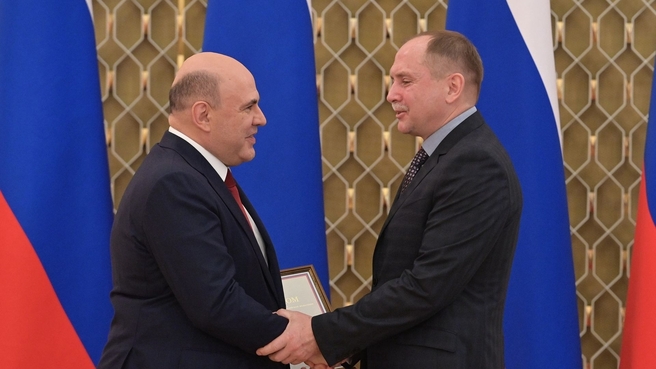
Mikhail Mishustin presents Government science and technology awards. . With Valery Solovyov, Director of the Department for Early Development of Protein Preparations of a BIOCAD Separate Subdivision
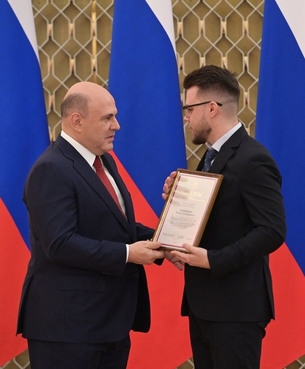
Mikhail Mishustin presents Government science and technology awards. With Nikita Kudryavtsev, Junior Research Fellow of the Scientific and Practical Clinical Center for Diagnostics and Telemedicine Technologies of the Moscow City Health Department
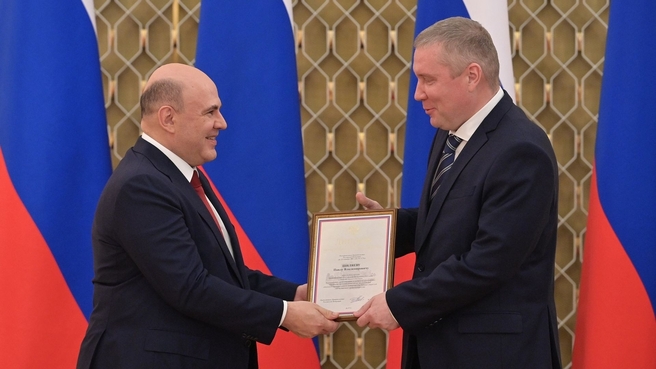
Mikhail Mishustin presents Government science and technology awards. With CEO of Magnitogorsk Iron and Steel Works Pavel Shilyaev
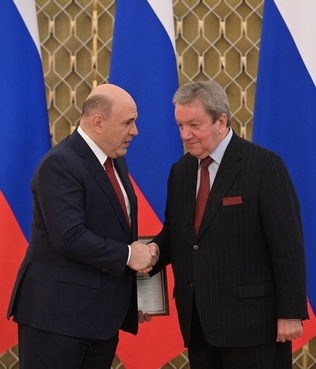
Mikhail Mishustin presents Government science and technology awards. With Gennady Semyonov, Senior Research Fellow of the Laboratory of the Centre for Collective Use “Advanced Packaging Solutions and Recycling Technologies” of the Moscow State University of Food Production
Mikhail Mishustin presents Government science and technology awards
Mikhail Mishustin’s remarks:
Colleagues, friends,
I am happy to welcome you to the Government science and technology awards ceremony.
We gather at the end of each year to honour our researchers’ achievements and contributions to economic and social development. This ceremony has become a good tradition.
Prominent Russian physicist and innovator Pyotr Kapitsa said: “Success in science is the work of people, not devices.”
Scientists are people who have faith in and dedication to their work. It is thanks to your knowledge, bold and sometimes daring ideas, and perseverance that breakthrough solutions are invented, to become technologies that make lives better.
This is the first year of the Decade of Science and Technology announced by the President. We have many things to achieve within these ten years. Our priority is to make research appealing to talented young people, and this goes beyond financial support for young scientists. We are building a research and social infrastructure to help the younger generation unlock their talents from their early school years.
It is important to engage, more actively, accomplished researchers in solving specific tasks that can bring progress to society and to the whole country; to offer opportunities for translating fundamental developments into innovative solutions that can be useful in production and other fields.
Naturally, it is important to promote Russian science and to introduce the public to national achievements, and to create a demand for Russian technology and research work. Our citizens must know that Russia produces high-quality and competitive products – and be interested in using them.
We have everything we need to achieve these goals.
Our efforts are particularly relevant as Russia continues to feel the growing pressure from abroad. We must focus on strengthening our technological sovereignty, with the full, active participation of the Russian science school.
Systematic work is needed to develop our own critically important technologies, and this can be done only on the basis of fundamental and applied science. The President reiterated this at a recent meeting with young scientists.
The Government's task here is to create the necessary basis for this, including financial support. The budget for the next three years provides for more than 1.5 trillion roubles for scientific research. At the same time, we have allocated funds for priority areas.
And, of course, people who are engaged in science should be well remunerated for their work. At a recent meeting, the President drew attention to the fact that wages in the economy as a whole are now rising slightly above the forecasts. Accordingly, there should be a comparable trend in the public sector, including for employees of federal government agencies involved in scientific research. The government has decided to spend another 3.8 billion roubles on increasing their salaries in line with the President’s executive order this past May in addition to the nearly 5 billion that were earlier earmarked for this purpose in the budget.
Next year, we will further increase the wage fund for public sector professionals to ensure that their salary targets are met without exception.
Friends,
It is you and your colleagues whom the country thanks for your achievements in fundamental and applied science. They lay the foundation for progress.
The development of megascience installations continues. In Koltsovo, Novosibirsk Region, a 4+ generation synchrotron radiation source, Siberian Ring Photon Source, is being created with six experimental stations. This will encourage the development of high-tech industries.
The research fleet is being upgraded. In September, the ice-resistant North Pole self-propelled platform was sent from Murmansk on the first expedition to conduct scientific research in the high latitudes of the Arctic Ocean.
Two new modern research vessels with an unlimited navigation area are also under construction.
A management system is also being formed in the sphere of science and technology, increasing the investment appeal of the research area in order to steward a scientific idea along its life path, from inception to transformation into a competitive product, a successful innovation that businesses would want to use in their enterprises.
Even today complex scientific and technical projects with a full innovation cycle are already being implemented, including the development and implementation of technologies for extraction of solid minerals and creation of petrochemical products manufacturing from hydrocarbon raw materials.
All of them are focused on solving specific problems the country is facing and are aimed at reducing dependence on foreign components.
Now I want to elaborate on the nominees for the Government Prize. It will be awarded to the creators of the 19 best works in a wide range of areas. Four of them were carried out by teams of young scientists who, under the guidance of experienced mentors, have achieved significant results in their fields.
All projects are of undeniable practical importance in the real sector of the economy, in urban construction, agriculture, geology, transport, the space industry, and medicine.
For many years, scientists around the world have been looking for ways to combat various types of cancer and vascular diseases. Today we can see scientific teams working to create promising methods to combat liver tumors, new principles of microsurgical treatment and intensive care for patients who have suffered various forms of stroke. These technologies will help people rid themselves or recover from disease.
Our laureates have made a significant contribution in developing agriculture and ensuring the food security of Russia by offering modern highly efficient technologies for processing, storing and assessing the quality of food products, as well as increasing crop yields. New microbiological preparations have been developed that will provide plant nutrition and protection from pests.
Solutions have been found for the country’s basic industrial sectors. Your inventions have opened up broad prospects for non-destructive certification of the physical and mechanical properties of rolled steel. New systems of alloying, control of technological processes and units are equal to, and often surpass world analogues in terms of consumer characteristics.
We have a big country with different climate conditions. In some regions, we need special equipment that is resilient to extremely low temperatures. Our scientists suggested highly effective wheeled vehicles. They are already used with success in the oil-and-gas sector, the forest and agro-industrial complexes in the Far North.
I cited just several examples. There are scientific achievements that will be used in power generation and oil processing plants. Each of them is a striking innovation in the most promising areas.
My friends,
Your example shows that Russian science is producing top-level specialists. I would like to sincerely thank you for your work and wish you good health, creative and scientific successes, and, of course, inspiration and new ideas. The Government will try to do its best to see them implemented.
Now let’s begin the award ceremony.
<…>
Mikhail Mishustin’s closing remarks:
My friends,
Please accept my heart-felt congratulations on your well-deserved awards. I would like to say a few words about the importance of scientific research for us today.
Research and development work is a most powerful driver of the entire national economy. It is the foundation of our technological and economic sovereignty. We are waiting for R&D to scale it directly in production so that our country – I will say it again – could ensure its absolute technological and economic independence and could showcase the achievements of Russian science for the world, not only for friendly countries but for all other states as well.
Today, you are demonstrating an example of public or public-private science that allows us to introduce the best solutions into practice.
There are very many areas. Today, we heard about major achievements in medicine. Quite recently, it was difficult even to imagine what Mr Kaprin spoke about. Today, we have resolved this problem. Today, speech recognition is offered to radiologists as a new technology. Nobody could imagine this 10-15 years ago.
There is new technology in construction, R&D that allows us to work in the Arctic today.
Or take agriculture, for instance. You described a big range of developments in this area and this is no surprise. Tremendous efforts by our agricultural producers have opened up new vistas for scientific progress as well.
I may omit some areas but believe me both the Government and the President are paying special attention to all of them.
I would like to offer my heartfelt congratulations once again on your well-deserved awards and the upcoming New Year and Christmas, and wish you all the best.
